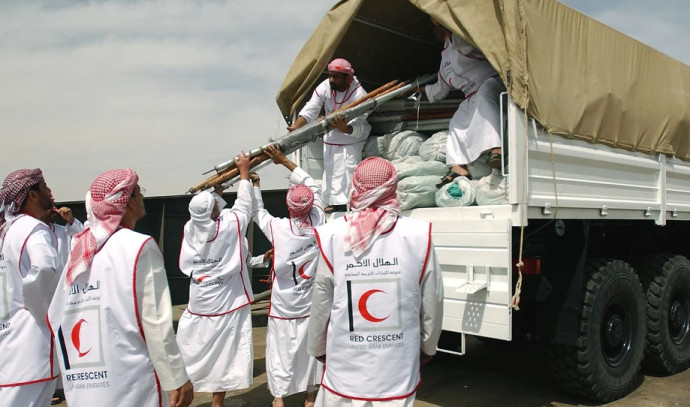The United Arab Emirates has sent a convoy of aid via land that has brought 370 tonnes of aid to northern Gaza. UAE state media, Emirates News Agency (WAM,) reported that “the Joint Operations Command of the Ministry of Defence announced the arrival of the first UAE aid convoy, comprising 17 trucks, bound for the northern Gaza Strip, as part of Operation ‘Chivalrous Knight 3.’”
This is an important development as many countries are trying to move more aid to northern Gaza. In the wake of an airstrike on World Central Kitchen humanitarian aid workers on April 1, Israel opened the Erez crossing to Gaza. The expectation is that this will enable more aid to reach northern Gaza and that aid could come through Ashdod and also via other corridors, such as from Jordan.
The UAE state media report, republished at Khaleej Times, said that the convoy to northern Gaza “is the first aid convoy by a country to arrive in the northern Gaza Strip, entering through the Rafah Border Crossing before arriving through the Karam Abu Salem border crossing to deliver aid to the Palestinians.” Al-Ain media in the UAE appeared to have been able to get first-hand accounts from the aid convoy’s arrival in Jabalya, a neighborhood that borders Gaza City and which was the scene of fighting in December 2023.
“In a narrow alley in the Jabalya refugee camp in the northern Gaza Strip, a group of children lined up with smiles on their faces as they shouted the Eid takbirat,” the report said. ‘Eid Takbirat’ refers to a common Arabic expression that is said during the holiday marking the end of Ramadan.
“In the seventh month of the war in Gaza, this scene of children re-frames the image of the devastated Strip. The destroyed buildings appear as fortresses in the face of the infernal war machine, while the language loses its validity.”
UAE’s humanitarian aid efforts
According to the Khaleej report, the convoy had food and medical supplies, such as “food supplements, clothing, shelter materials, and other necessities. With this new batch, the total amount of aid that the UAE provided to northern Gaza by air and land during Ramadan has reached 2,102 tonnes. This includes aid shipped by land through the Karem Shalom crossing and by air through the operation.”
The report notes that the aid is delivered under the “framework of the directives of President Sheikh Mohamed bin Zayed Al Nahyan to intensify humanitarian aid efforts to support the Palestinian people in the Gaza Strip during Ramadan.”
The report notes that airstrikes and IDF operations targeted Jabalya during the war and that it “witnessed many massacres, and like most of the north in the Strip, it suffered the lion’s share of destruction, siege, and hunger.” It was not clear which “massacres” the report referred to, but it appears to mean, in general, that the area suffered civilian casualties.
The convoy that reached northern Gaza consisted of 17 trucks. It is the first time that UAE aid has reached the north of Gaza via truck. In the past, UAE aid had reached the north through airdrops coordinated with Jordan and via sea in a mission with the World Central Kitchen. After the WCK humanitarian workers were killed, the WCK and the UAE paused their support for the maritime aid corridor via Cyprus.
“The children who grabbed eating utensils chanted ‘Allahu Akbar’ for Eid, which falls today, Wednesday, without any indication of a truce, despite continued American and Arab efforts to establish it,” the report at Al-Ain noted. The report also noted that the “children of Gaza imposed their peace by snatching this moment of holiday joy.” It noted that Israel has withdrawn from Gaza except for the forces controlling the Netzerim corridor that separates northern Gaza from central Gaza.
The movement of aid on trucks backed by the UAE to northern Gaza is an important development, and reports from Jabalya are also important. The report illustrates that civilian life is returning to Jabalya, and it contrasts the lack of a ceasefire deal with the “peace” that the people are able to have, at least temporarily, despite the lack of a ceasefire. This sheds light on the larger trends in northern Gaza.







